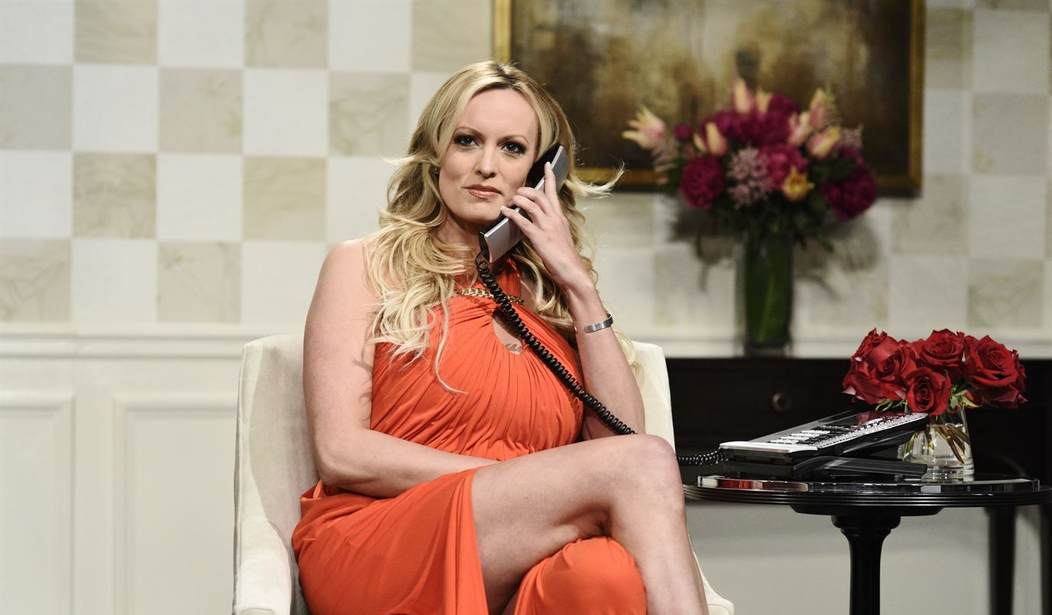With very little fanfare or press coverage, the Federal Election Commission on Thursday voted to close the investigation into the payments of “hush money” to Stormy Daniels by Donald Trump in the weeks leading up to the 2016 election, according to the Washington Post.
The FEC normally has six members — 3 Democrats and 3 Republicans. One GOP member had recused from the vote, and one Democrat member was absent. The final vote was 2-2 — splint along party lines — but the effect of that vote was to not go forward with any further investigation.
Trump’s former attorney, Michael Cohen, was previously charged with a violation of campaign finance law in connection with the payments to Daniels. He pled guilty to that charge as part of a plea package on several additional tax and fraud matters.
The FEC investigation is a civil matter, but the GOP Commissioners stated that Cohen had been prosecuted and pled guilty, and because the Department of Justice had already investigated the matter without bringing further charges, it was a poor expenditure of Commission resources to continue looking into the matter when the statute of limitations on any civil campaign finance claims was about to run out.
The Democrats on the Commission disagreed, WaPo reported, in a statement:
“To conclude that a payment, made 13 days before Election Day to hush up a suddenly newsworthy 10-year-old story, was not campaign-related, without so much as conducting an investigation, defies reality,” Chair Shana Broussard and Commissioner Ellen L. Weintraub said in a statement Thursday. “But putting that aside, Cohen testified under oath that he made the payment for the principal purpose of influencing the election. This more than satisfies the Commission’s ‘reason to believe’ standard to authorize an investigation.”
The statement of the two Democrat Commissioners is an oversimplification of a much more complicated issue. Cohen and Trump were accused of different types of campaign finance laws, and Cohen’s actions don’t necessarily implicate Trump. Cohen arranged to have the National Enquirer pay Daniels a sum of money to buy exclusive rights to the story about Daniels and Trump, with the Enquirer having no intention to run the story. That’s what is called a “capture and kill” tactic in dealing with potentially embarrassing information.
By doing so, however, Cohen caused a corporation to expend funds for the purpose of influencing an election — according to Cohen’s admission — and campaign finance laws prohibit expenditures of funds by corporations to benefit federal election campaigns.
The allegations against Trump, which the Democrats want to continue, are payments made by Cohen to Daniels on Trump’s behalf. The problem with the charge that the Democrats want to pursue is that it presents a theory of liability that has never been tested in court and held up on appeal.
The Department of Justice attempted to do so in a criminal case against John Edwards for payments he made to support his child out of wedlock in an effort to keep the existence of that child out of the press. Those payments were made during the primary season leading up to the 2008 elections. There remains a legal dispute never resolved as to whether the payments must be made 100% out of a motivation to benefit the campaign, or whether it is enough that the payments were made only partly for the purpose of benefitting the campaign.
Edwards claimed — and Trump could claim as well — that the payments were motivated by his desire to spare his wife, then dying of cancer, from the public humiliation and embarrassment of publicity about a child he had out of wedlock. Trump could make the same “preserving marital harmony” claim about his motives to pay off Stormy Daniels.
The jury in the Edwards case hung and did not reach a verdict on the campaign finance charges. The Obama Justice Department chose to not retry the case.
To date, I’m not aware of any court decision which has validated the Justice Department or SEC theory that “mixed motives” in paying to keep information from coming out are sufficient to make a campaign finance claim.
Even if that turns out to be the case at some point, because a candidate is free to spend as much as his or her own money as they want, Trump’s only offense involving the payments to Daniels would be a record-keeping offense for failure to timely report the expenditure.
There is simply no good purpose or continuing on with this investigation based on an interpretation of campaign finance laws that is likely unsustainable on appeal. For that reason, voting to close the investigation is the correct call.















Join the conversation as a VIP Member